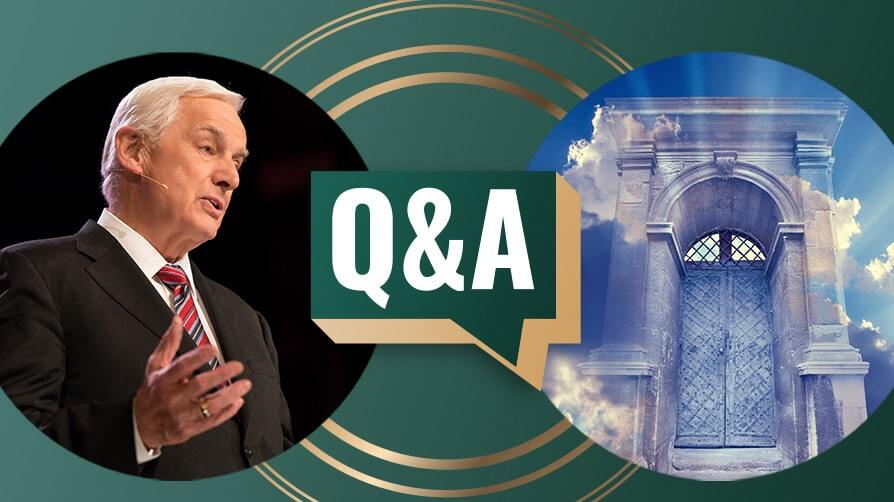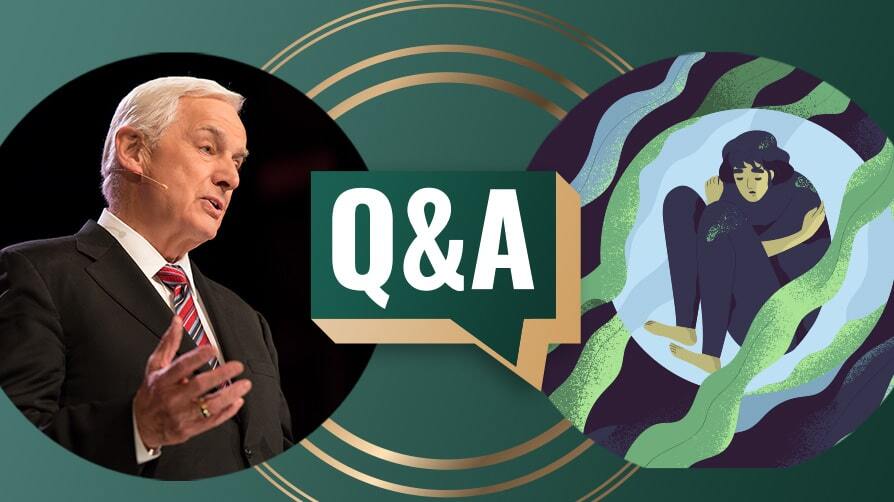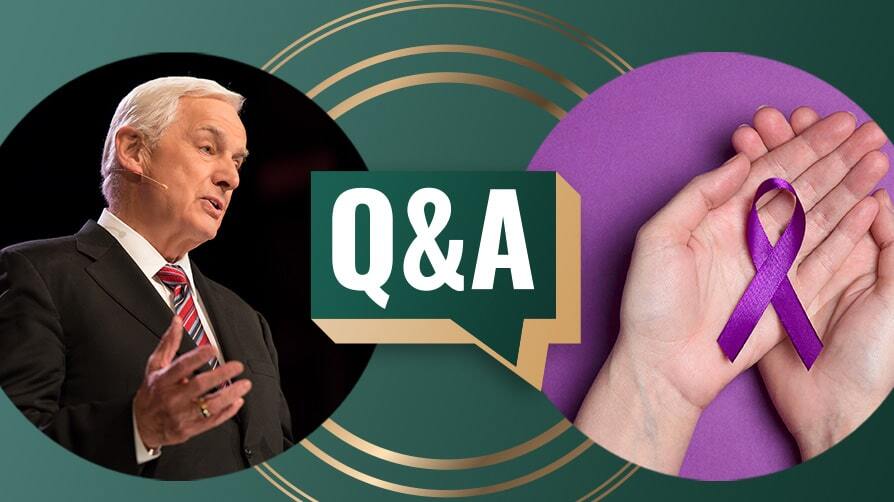Throughout the Making Sense of It All campaign, we will be inviting you to share questions with us about the challenging situations you are trying to make sense of in your life. Take a look at what Dr. David Jeremiah says about our future in heaven!
Click here to view all the questions and answers.
Share your questions with us here or on Facebook.
{ms_advert_1_box}Terri, a Top Fan on Facebook, wonders, “What will relationships be like in our everlasting world? Some hold so tightly to family now, while others feel a crushing absence of family/friends. What will ‘family’ mean when Jesus is our source of light? How will we see each other and relate to each other in the light in the new kingdom to come?”
David Jeremiah responds: Your question is a good one. People often ask me if we will know each other in heaven, and my answer is a resounding “Yes.” When Jesus appeared to the disciples in His resurrection body, they knew who He was. They knew this Jesus who was with them after His death and resurrection was the very same Jesus they had known before His crucifixion. They believed this so deeply that they all went to their death proclaiming the reality of His resurrection.
When we get to heaven, we’re going to know all the people we met down here, and they’re going to know us.
And that’s the way it will be for us. When we get to heaven, we’re going to know all the people we met down here, and they’re going to know us. It’s unthinkable to me that, in heaven, we will know less than we do here. First Corinthians 13:12 says, “For now we see in a mirror, dimly, but then face to face. Now I know in part, but then I shall know just as I also am known.” We will have a greater sense of recognition in heaven than we ever had on this earth.
Those who endure the pain of loneliness in this life can look forward to abundant fellowship as members of God’s family in heaven.
Are you ready for more good news? Those who endure the pain of loneliness in this life can look forward to abundant fellowship as members of God’s family in heaven. Hebrews 12:22–23 tells us that the heavenly Jerusalem will be occupied by “an innumerable company of angels” and “the spirits of just men made perfect.” In other words, we will spend eternity in the company of angels, the Old Testament saints, and the population of the entire Church of Jesus Christ.
Even at our best here on earth, we sometimes wonder about people’s motives and meanings. But in heaven, there will be none of that. There will be complete honesty, openness, and vulnerability to one another. Fear, ulterior motives, manipulation—all the things that separate us from one another on earth will be gone. Because we’re so used to the hurtfulness that exists in our world, it’s hard even to imagine the fellowship we will enjoy in heaven.
Just think about it for a moment. We will have the unlimited opportunity to fellowship with people from every age of history. Would you like to spend time with Deborah, Elijah, or the apostles? What about C. S. Lewis, Charles Haddon Spurgeon, or Susanna Wesley? They will have all the time in the world to make your acquaintance. And as wonderful as this is, these relationships will be overshadowed by the presence of our Lord Jesus Christ, who calls us His brothers and sisters and is preparing a place in heaven for each person who trusts Him as their Lord and Savior (Hebrews 2:11; John 14:3). Heaven will be far from lonely!
{ms_advert_3_row}Throughout the Making Sense of It All campaign, we will be inviting you to share questions with us about the challenging situations you are trying to make sense of in your life. Many problems do not have simple solutions, but here are some brief answers from David Jeremiah to address the most asked questions about loneliness. Be sure to follow his teaching series for more tools that will help you live fearlessly in a scary world.
Click here to view all the questions and answers.
Share your questions with us here or on Facebook.
{ms_advert_3_box}Making Sense of Broken Relationships and Loss
Robin wonders, “My husband died in August. I’m not close to wanting a relationship, but with Covid–19, my options are slim to none. I wonder how I will ever have a loving relationship again.”
David Jeremiah Replies: People face different kinds of loneliness. But when we lose a loved one, it touches the very core of our lives. I don’t have to tell you that survivors of death, divorce, and estrangement experience the most intense form of loneliness and often believe their pain is insurmountable. Before long, loneliness can give way to hopelessness.
Once these feelings set in, many people choose to remain lonely because they fear rejection. They imagine that rejection would hurt worse than being alone, so they spend a great deal of time and money avoiding it. I want to caution you against this. Those who expect to be rejected usually will feel that they are. Those who expect to receive friendship and comfort usually will.
Instead, focus your thoughts on Christ, who has given you this promise:
Ask, and it will be given to you; seek, and you will find; knock, and it will be opened to you. For everyone who asks receives, and he who seeks finds, and to him who knocks it will be opened…. Whatever you want men to do to you, do also to them, for this is the Law and the Prophets. (Matthew 7:7–8, 12)
When you need friendship and comfort, offer friendship and comfort, and don’t expect rejection. During the pandemic, this will require additional creativity, but it is still possible. Contact your church and ask to be part of the prayer ministry. While you’re on the phone, ask about support groups for people in your situation. Perhaps you could volunteer at the local food bank, library, or school. Whatever you do, accept yourself where you are, and remember that Christ will not reject you. He will always respond with loving acceptance.
Your greatest source of comfort and hope is Christ Jesus.
You can become a survivor in Christ through your faith in Him. In Christ, you can survive grief and loneliness. Your greatest source of comfort and hope is Christ Jesus. And that hope can propel you into a spirit of praise and thanksgiving for His constant care.
Finally, let me offer this encouragement: It is not sinful to experience loneliness. You have good company in your suffering. The prophet Jeremiah struggled with loneliness as he stood for righteousness in an evil time. Ruth moved to a foreign country as a poor widow with only one companion (who was also grieving). King David not only experienced abandonment and discouragement, but he was betrayed and even hunted by those close to him.
Loneliness only becomes a sin when we indulge it. Equip yourself with a few verses that are particularly encouraging to you. Keep them close at hand and meditate on them. It is hard to remain discouraged when you realize, “God is our refuge and strength, a very present help in trouble” (Psalm 46:1).
Making Sense of Retirement
Lina says, “I retired this last year due to low immunity and trying to stay safe from COVID. I have worked all my adult life and am finding it difficult to find purpose. I am praying for a place to be useful and maybe be a blessing to others. I am sure I am not the only one.”
David Jeremiah replies: In this new season, I encourage you to stay connected to your calling from God. While some people opt for a wholesale change after retirement, I’ve observed that those who finish best never consider themselves retired from their primary calling. There is no “best if used before” date stamped on your soul. Abraham was 100 years old when Isaac was born, and Caleb was 85 when he received his inheritance in the Promised Land. According to Scripture, “The gifts and the calling of God are irrevocable” (Romans 11:29).
Try to maintain a connection between what you did before you retired and what you do now. Someone said, “Your career is what you are paid to do. Your calling is what you were made to do.” Many of my friends who pastored all their lives have continued to preach during their retirement. They find new ways and means of teaching and preaching. For many of them, it’s a welcome change. They’re able to continue doing what they love without all the administrative hassles that go along with being a full–time pastor.
If you’re a follower of Christ, you have a calling—a gift.
You may not have a career that’s transferable into your post–retirement life, but if you’re a follower of Christ, you have a calling. You have a gift. Is there something you’ve always yearned to do but didn’t have time for it before retirement? Now’s the time. God has given you an ability for service. So keep using it for the Lord.
For a more thorough answer, my recent book Forward offers a step–by–step plan to discover God’s plans for your tomorrow—including retirement.
Making Sense of Isolation
Marcia is a widow who recently moved to a new town. COVID has made her feel even more alone and forgotten.
Joan says, “Loneliness has been so hard for seniors. Miss seeing my friends.”
Marian is praying for a godly man to marry.
Cindy doesn’t feel connected at church.
David Jeremiah responds: Long before COVID–19 entered our world, we faced a pandemic of loneliness. The changing social structures of our modern society have been slowly separating us for years. Families are more spread out geographically. More and more people are living alone. And our culture encourages those who are suffering a loss to retreat within themselves until they have recovered. Social distancing has only intensified the situation.
From time to time, you will meet a Christian who says, “I don’t really need friends. I have the Lord.” I’ve heard that. But God does His best work through other people.
From time to time, you will meet a Christian who says, “I don’t really need friends. I have the Lord.” I’ve heard that. But God does His best work through other people, and He does His best loving through people that God puts on this earth. He put us together on this earth so that we can express love and friendship one to another. Life is so difficult that we all need friends.
Let me encourage you not to live in denial. You’ve taken a necessary step by admitting that you are struggling. The next step is to ask for God’s help.
Only God can solve the problem of loneliness. He created us in such a way that our emptiness can only be filled by an intimate relationship with Himself. Until God is at home in our hearts through the work of Jesus Christ on the cross, we’ll always feel incomplete. When Paul described his loneliness in 2 Timothy 4:16–17, he concluded by saying, “No one stood with me, but all forsook me…. But the Lord stood with me and strengthened me.” He will do that for you, too.
Hearing God’s voice through the pages of Scripture is one of the best remedies for loneliness. He will speak to your situation if you read His Word. Search the Bible for verses that reassure your heart and mind, like these:
“The eternal God is your refuge, and underneath are the everlasting arms” (Deuteronomy 33:27).
“I will pray the Father, and He will give you another Helper, that He may abide with you forever” (John 14:16).
“For your Maker is your husband, the Lord of hosts is His name; and your Redeemer is the Holy One of Israel” (Isaiah 54:5).
“At my first defense no one stood with me, but all forsook me. May it not be charged against them. But the Lord stood with me and strengthened me, so that the message might be preached fully through me, and that all the Gentiles might hear. Also I was delivered out of the mouth of the lion. And the Lord will deliver me from every evil work and preserve me for His heavenly kingdom. To Him be glory forever and ever. Amen!” (2 Timothy 4:16–18)
“I love the Lord, because He has heard my voice and my supplications. Because He has inclined His ear to me, therefore I will call upon Him as long as I live” (Psalm 116:1–2).
Finally, brethren, whatever things are true, whatever things are noble, whatever things are just, whatever things are pure, whatever things are lovely, whatever things are of good report, if there is any virtue and if there is anything praiseworthy—meditate on these things. The things which you learned and received and heard and saw in me, these do, and the God of peace will be with you” (Philippians 4:8–9).
Do what you can to be part of the community of believers. I know it’s challenging right now, but there are ways to take the initiative and get involved. Join a small group, even if you can only meet online. You might provide a meal for a family with a new baby or someone who is undergoing medical treatment. Write notes of encouragement to those who are ill or in a similar situation to yours. God’s wonderful secret for victory over isolation is a combination of His presence, His Word, and His people.
{ms_advert_7_row}I need help

Your response has been received, and we will be praying for you.
Look for answers to some of the most common questions in the weeks ahead.
Throughout the Making Sense of It All campaign, we will be inviting you to share questions with us about the challenging situations you are trying to make sense of in your life. Many problems do not have simple solutions, but here is a brief answer from David Jeremiah to address one of the questions from this week. Be sure to follow his teaching series for more tools that will help you live fearlessly in a scary world.
Click here to view all the questions and answers.
Share your questions with us here or on Facebook.
Jessica wants to know: Did Satan have to get permission from God to give me epilepsy and seizures?
David Jeremiah replies: In 1994, I received a diagnosis of Non–Hodgkin’s Lymphoma. Since then, I’ve been asked all sorts of questions, including this one: “You’re a pastor. How did you get cancer?” I’ll tell you, the problem I have is a problem we all have. I suffer from what they call “humanity.” All of us, Christians included, get the same diseases as everyone else. That includes cancer and epilepsy.
All of us, Christians included, get the same diseases as everyone else. That includes cancer and epilepsy.
It all started in the Garden of Eden. God created Adam and Eve in a state of perfect health. Their bodies were free from disease until they sinned. Once the perfection of nature was destroyed, sickness and death became a grim reality for every human being. While we are on this earth, we can expect to spend at least a portion of our time ill, diseased, injured, wounded, or dying.
In 2 Corinthians 12:7, we discover that the apostle Paul was no exception. He had what he describes as a “thorn in the flesh.” While Scripture doesn’t define Paul’s weakness, we know God allowed this affliction in his life, and it was directly tied to the glory of God’s revelation to him. We also know God chose not to relieve Paul’s suffering. Instead, He told him, “My grace is sufficient for you, for My strength is made perfect in weakness” (2 Corinthians 12:9).
In our case, we may not always know the exact reason for our suffering. But we have the assurance that God knows best and is at work in our life in some way, just as He was at work in the apostle Paul’s. There is something stronger than affliction, and that is the grace to endure it. Our natural response to sickness and suffering is usually, “Why, Lord?” With some perspective, we can transform our question to, “What, Lord, do You want me to learn from this?” That is the most helpful question to ask. If we will pray that way, I am confident God will answer.
In our case, we may not always know the exact reason for our suffering. But we have the assurance that God knows best and is at work in our life in some way, just as He was at work in the apostle Paul’s. There is something stronger than affliction, and that is the grace to endure it.
I am equally confident that God wants to use you! You’re in the perfect position to trust Christ’s strength through your weakness. Thank you for submitting your question. You are not alone. The Turning Point family is praying with you and for you.
Throughout the Making Sense of It All campaign, we will be inviting you to share questions with us about the challenging situations you are trying to make sense of in your life. Many problems do not have simple solutions, but here are some brief answers from David Jeremiah to address the most asked questions from this week. Be sure to follow his teaching series for more tools that will help you live fearlessly in a scary world.
Click here to view all the questions and answers.
Share your questions with us here or on Facebook.
{ms_advert_3_box}Josh, JulieGene, and Brenda want to know about the COVID vaccine: I’m trying to make sense of this vaccine. I believe it is a prelude to the mark of the Beast. What’s your opinion on the vaccine? Should we be afraid of it?
David Jeremiah replies: Without a doubt, prophecy casts its shadow on current events. What we are seeing now is an example of how the Antichrist could operate during the Tribulation period. This does not mean the COVID–19 vaccine has anything to do with the Antichrist—it merely provides an illustration of how his mark might be applied after the Lord comes for His Church.
What we are seeing now is an example of how the Antichrist could operate during the Tribulation period. This does not mean the COVID–19 vaccine has anything to do with the Antichrist—it merely provides an illustration of how his mark might be applied after the Lord comes for His Church.
For God’s people, the best strategy is to focus on Scripture rather than the Internet. Leading up to the Last Days, God’s Word describes a breakdown in society and acceleration of natural disasters, wars, rumors of wars that signal the imminence of Christ’s return.
For God’s people, the best strategy is to focus on Scripture rather than the Internet.
But know this, that in the last days perilous times will come: For men will be lovers of themselves, lovers of money, boasters, proud, blasphemers, disobedient to parents, unthankful, unholy, unloving, unforgiving, slanderers, without self–control, brutal, despisers of good, traitors, headstrong, haughty, lovers of pleasure rather than lovers of God (2 Timothy 3:1–4).
Now the Spirit expressly says that in latter times some will depart from the faith, giving heed to deceiving spirits and doctrines of demons, speaking lies in hypocrisy, having their own conscience seared with a hot iron, forbidding to marry, and commanding to abstain from foods which God created to be received with thanksgiving by those who believe and know the truth (1 Timothy 4:1–3).
Scoffers will come in the last days, walking according to their own lusts, and saying, “Where is the promise of His coming? For since the fathers fell asleep, all things continue as they were from the beginning of creation” (2 Peter 3:3–4).
Little children, it is the last hour; and as you have heard that the Antichrist is coming, even now many antichrists have come, by which we know that it is the last hour (1 John 2:18).
Because these signs are evident in our world today, we know the time is short, and we need to be about the Master’s business. Our God is the One who controls history, and He is worthy of our trust. The Lord Jesus reigns! “He has on His robe and on His thigh a name written: King of Kings and Lord of Lords” (Revelation 19:16). Victory is secure.
{ms_advert_5_row}Joyce wants to know: I am dealing well with this pandemic, just wondering if this pandemic is a biblical plague…. Are we, in America, under judgment now?
David Jeremiah replies: I think your question is on the hearts of many people right now. The COVID–19 pandemic is the most apocalyptic event that has ever happened to us. But even so, God’s final judgment of planet earth has not yet begun. Everyone who trusts Jesus as their Lord and Savior will be raptured to heaven before God’s judgment falls.
The COVID–19 pandemic is the most apocalyptic event that has ever happened to us.
That still leaves us with the question of whether we are living in the final days before Christ’s return—could the pandemic a sign of the End Times?
Our first step is to define what a sign is. A biblical sign is an event, symbol, object, place, or a person whose existence or occurrence indicates something important in God’s plan for the future. As we near the end of the age, “There will be signs in the sun, in the moon, and in the stars; and on the earth distress of nations, with perplexity, the sea and the waves roaring” (Luke 21:25).
But we have to be careful here. Prophetic signs are not prerequisites to the Rapture. We have it on the authority of the Lord Jesus Christ that there will be no announcement preceding the Rapture. He will come for us imminently, without warning or sign. What I will say is future events cast their shadows before them. This means we can expect to see a groundswell of subtle warnings develop in our world today.
Could the pandemic be a precursor to the seven years of Tribulation and the Lord’s Second Coming? I cannot say with any sense of certainty that it is, but neither can I say it is not. It could be an early indication of the coming pestilence Jesus referenced in Matthew 24:7.
Is COVID–19 a sign of the Rapture? No, the Rapture will happen without warning. Could the pandemic be a precursor to the seven years of Tribulation and the Lord’s Second Coming? I cannot say with any sense of certainty that it is, but neither can I say it is not. It could be an early indication of the coming pestilence Jesus referenced in Matthew 24:7.
The pandemic has raised a lot of uncertainties, but we can cling to the promises of Scripture. You can have confidence knowing, “The Lord, He is the One who goes before you. He will be with you, He will not leave you nor forsake you; do not fear nor be dismayed” (Deuteronomy 31:8).
Throughout the Making Sense of It All campaign, we will be inviting you to share questions with us about the challenging situations you are trying to make sense of in your life. Many problems do not have simple solutions, but here are some brief answers from David Jeremiah to address the most asked questions from this week. Be sure to follow his teaching series for more tools that will help you live fearlessly in a scary world.
Share your questions with us here or on Facebook.
{ms_advert_1_box}Judy, Darlene, and LuAnn want to know: So many people are allowing politics to divide our country and us as Americans and children of God. How can I know the difference between turning the other cheek and taking a stand for what is right?
David Jeremiah replies: America was originally founded on Christian principles, but this foundational premise began to erode after World War II. Today momentum for the downward trend is building. The government, the educational system, the entertainment industry, and the media no longer share our values, which means faithful Christians are becoming alienated from the dominant forces in society. Christianity is now a religious subculture, increasingly demonized, ridiculed, and marginalized.
There are three decisions we can make: determine to stand for truth, draw support from one another, and derive your security from the Lord.
Persecution is not too strong a word to describe what is happening to Christians in America today. To be persecuted for righteousness’ sake means that we are hated or opposed or suffer solely for following Christ and living for God. In our nation, we are experiencing five stages of religious suppression: stereotyping, marginalizing, threatening, intimidating, and litigating. I think America is a long way from the kind of persecution that involves torture and death, as Christians endured in the New Testament and now endure in other countries. But one never knows what may lurk around the corner. In my younger days, I never in my wildest nightmares dreamed that Christianity would be under fire as it now is in the United States.
How should Christians in the United States react to persecution? The first response might naturally be anger. But the New Testament gives us a more constructive response. The early Christians suffered much more severe persecution than anything we presently face, and we never find them responding in anger. In fact, they found positive benefits in suffering. They discovered suffering promotes character (Romans 5:3–5), provokes courage (Acts 4:19–20; Philippians 1:20–21), proves godliness (2 Timothy 3:12; Hebrews 12:6; 1 Peter 5:10), produces joy (Acts 16:25; 5:41), and provides rewards (Hebrews 11:24–26).
When we view the current political climate in light of God’s eternal plan, there are decisions we can make and steps we can take in advance to steel ourselves for that moment when persecution comes. Let’s look at three things we can do to prepare for that moment.
- Determine to stand for truth. It is imperative that fear of rejection, criticism, or loss does not cower us into hiding our light. To live worthy of the Gospel is to stand for God’s truth without bending. As Paul urged the Corinthians, we are to “watch, stand fast in the faith, be brave, be strong. Let all that you do be done with love” (1 Corinthians 16:13–14).
- Draw support from one another. We cannot be Christians alone. We need the company of others like ourselves with whom we can share encouragement, struggles, and victories. It is easy for us to feel alone and discouraged, but in the company of fellow believers, we draw strength, discipline, knowledge, encouragement, support, and love from one another. A courageous example can spur any one of us to say, “If he or she can do it, by God’s grace, so can I.”
- Derive your security from the Lord. The key to standing firm in the face of persecution is to remember whom we belong to and where we are going. We belong to Christ, and He secures us in His hand. Thus, we need not fear danger to our reputations, our jobs, our finances, or even our physical lives. As He said, “For whoever desires to save his life will lose it, but whoever loses his life for My sake will find it” (Matthew 16:25).
Janet wants to know: I’m trying to make sense of how this all fits into God’s timeline and the Revelation of Christ’s return.
David Jeremiah replies: In Matthew 24, our Lord predicted the future of world history and the end of the age. Now, I believe the signs in Matthew 24:4–14 represent a description of the first half of the tribulation period. But these trends and events are not going to suddenly appear when the Rapture comes. They’re going to increasingly characterize these Last Days leading up to the Rapture of the Church, as they reverberate backward through time.
The Rapture is the next event on God’s prophetic calendar, and it will occur without warning. It could happen at any time! We can almost hear the countdown. We’re living in prophetic times and seeing prophecy fulfilled right before our eyes. When we consider world events, we can see that the signs of Matthew 24 are intensifying. It’s time to look up, for our redemption draws near!
Practice putting these three steps into action to find peace in your heart: trust the Lord and do your duty, keep calm and don’t be afraid, and carry on and rely on God to fight for you.
During these troubled times, we can find personal peace by considering God’s message to two Old Testament figures. When King Ahaz and the nation of Judah were facing invasion by two enemies, the Lord gave this message through the prophet Isaiah: “Be careful, keep calm and don’t be afraid. Do not lose heart because of these two smoldering stubs of firewood” (Isaiah 7:4, NIV). Even earlier, Moses had told the Israelites by the Red Sea: “Don’t be afraid. Just stand still…. The Lord himself will fight for you. Just stay calm” (Exodus 14:13–14, NLT).
This is a message for us: “Be careful… keep calm… don’t lose heart… stand still… the Lord will fight for you.” Do those words reverberate in your heart right now? The devil may try to invade your orbit and disrupt your day. The truth is we may have battles on multiple fronts because of the turbulent times we live in, but as we fix our thoughts on Jesus, we will be able to claim His perfect peace and persevere. Practice putting these three steps into action to find peace in your heart: trust the Lord and do your duty, keep calm and don’t be afraid, and carry on and rely on God to fight for you.
{ms_advert_6_row}Lori wants to know: I’m trying to make sense of praying. I know it’s important, and yes, I do pray. But I wonder why some Christian people are healed of disease, illness, while others are not. It doesn’t stop me from praying; I just wonder why.
David Jeremiah replies: The greatest challenge in the loss of health is to keep trusting God. We know that He cares for us and that we have ultimate healing through the shed blood and empty tomb of Jesus Christ. But the loss of health affects us emotionally as much as physically. It puts us at risk financially and vocationally. It sets us on a collision course with our most dreaded enemy—death—and we may find ourselves in real mortal danger, exposed to possible suffering, chronic pain, and the loss of all we hold dear in life.
It is important to remember that as long as we’re in this world, God intends to use us. Our work isn’t over until He takes us home. Christian history tells us that some of the greatest works for God have been done by people battling illness or disability.
When our car breaks down, we take advantage of those who have repair skills. In the much more important area of our health, we do the same. We pray for God to guide us to doctors who can help; we pray for their wisdom and skill; we discipline ourselves to follow healing regimens; we trust God to do “exceedingly abundantly above all that we ask or think”(Ephesians 3:20). Health challenges should be faced the same way we face any other challenge in the Christian life—with faith in God’s power to accomplish His purposes.
It is important to remember that as long as we’re in this world, God intends to use us. Our work isn’t over until He takes us home. Christian history tells us that some of the greatest works for God have been done by people battling illness or disability. Illness is many things, not the least of which is the opportunity to grow deeper in Christ. Many, including myself, can attest to the spiritual growth that can occur during health challenges. Priorities become clearer than ever before. The promises of God are read with refined eyes. And spiritually, we grow grateful for the grace of God and the gift of life.
Certainly, discouragement sometimes comes with prayer, but remember this: There will always be discouragement without prayer! Discouragement follows prayerlessness like winter follows fall. But when we choose to continue praying, even through a long and barren winter, eventually spring arrives, and with it comes new life. At that point, discouragement has no choice but to find somewhere else to live.
{ms_advert_8_row}Karen and Judy want to know: What God is trying to tell us by allowing Satan control over all the things happening in the world today? Why is He silent and not intervening? Is it the Second Coming?
David Jeremiah replies: As world conditions worsen, Jesus said we shouldn’t hang our heads in hopelessness or shake our heads in confusion. Instead, we should lift our heads in expectation, for our redemption draws near (Luke 21:28). After Paul told the Thessalonians about the sudden return of Christ in the air for His people, he said, “Comfort one another with these words” (1 Thessalonians 4:18).
As world conditions worsen, Jesus said we shouldn’t hang our heads in hopelessness or shake our heads in confusion. Instead, we should lift our heads in expectation, for our redemption draws near (Luke 21:28).
Our world is in a state of depression. Proverbs 12:25 states: “Anxiety in the heart of a man causes depression, but a good word makes it glad.” Obviously, there are times when medication is absolutely called for, but meditation is often better. When we visualize our Lord’s return, we’re treating our souls to a “good word.”
Jesus told His worried disciples on His last night with them, “Let not your heart be troubled; you believe in God, believe also in Me. In My Father’s house are many mansions.… I will come again and receive you to Myself” (John 14:1–3).
Try this experiment. One evening, sit down and watch television for an hour, focusing on a roundup of the world news. It’ll be an hour filled with riots, war, politics, problems, budget deficits, serial killers, and natural disasters. Reflect on how you feel afterward.
The next night, turn off the television and study First and Second Thessalonians, two little books in the New Testament with much to say about the Lord’s return. Read Paul’s promise that God will give His anxious children rest “when the Lord Jesus is revealed from heaven with His mighty angels” (2 Thessalonians 1:7). After an hour of pondering the eight short chapters of the Thessalonian epistles, my guess is you’ll have joy in your heart as you anticipate His return.
The study of the signs of the times isn’t just for “Second Coming scholars.” It’s for every single Christian who loves His appearing. It’s comprehensible, and it’s compelling, and it will change your life. It is a practical subject with tangible benefits, and those who study it are happier, holier, healthier people. We can rightly consider it the greatest self–improvement course we can take, and the benefits are eternal.
During these challenging days, find out what the Bible has to say about the prophetic times, and learn to pray: Even so, come, Lord Jesus!












